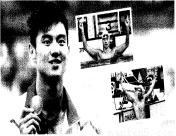题目内容
Dr Smith, together with his wife and daughters, ______ visit Beijing this winter vacation.
A.is going to B.are going to
C.was going to D.were going to
A
【解析】
试题分析:考查主谓一致以及时态。在英语中如果主语由together with/with/rather than/as well as/except/in addition to/apart from等连接时,谓语动词需要和前面的主语保持一致,故本句谓语动词应和Dr Smith 保持一致,也是说答案在A或C中产生。根据本句时间状语this winter vacation可知,本句时态为一般现在时,所以选择A。句意为:Dr Smith和他的妻子女儿们今年寒假将会来参观北京。
考点:考查主谓一致以及时态

练习册系列答案
相关题目
